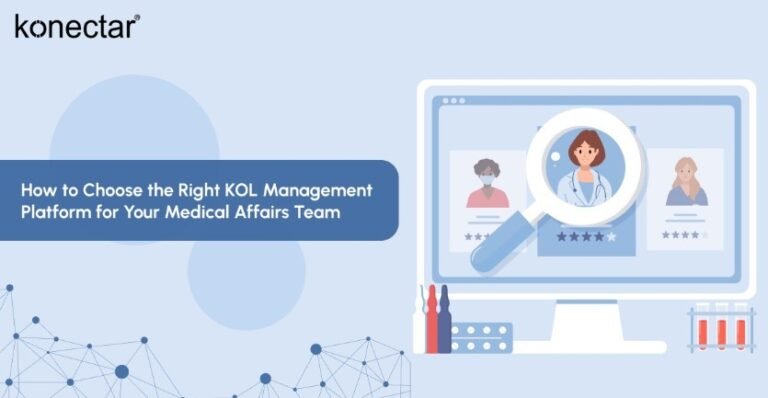Selecting the right KOL management platform is no longer just a tactical decision, it’s a strategic one. That’s because the platform you choose influences how effectively your medical affairs team identifies key healthcare professionals, engages with them, and sustains long-term scientific relationships.
With multiple KOL management companies and technology vendors offering varying levels of data, analytics, and support, the challenge lies in finding a solution that aligns with your team’s objectives and compliance needs.
In this blog, we will explore: what to look for in a reliable KOL management platform, the role it plays in strengthening pharma KOL engagement, and a practical roadmap to selecting the right vendor for your organization.
What Does a KOL Management Platform Do?
A KOL management platform provides more than a list of experts. The best companies combine technology, data, and strategy to create a full-service solution that supports your medical affairs objectives. Key offerings often include:
KOL Identification
Leveraging publication databases, AI-driven analytics, and conference data to identify the most relevant experts within a therapeutic area or geography.
KOL Profiling
Creating detailed profiles that capture clinical trial involvement, scientific output, digital influence, collaborations, and professional networks.
KOL Mapping
Visualizing networks of influence by mapping connections between KOLs, rising stars, institutions, and scientific communities to understand reach and collaboration patterns.
Analytics and Reporting
Delivering dashboards that track KOL activities, influence, and your share of scientific voice, while providing metrics for benchmarking and strategy refinement.
CRM Integration
Integrating with CRM software to centralize expert data, record interactions, and manage the entire contact lifecycle—from initial outreach through long-term engagement.
Social Media Analytics
Monitoring digital presence and scientific conversations across social platforms to identify new influencers, track sentiment, and capture real-time insights.
Payment Analytics
Understanding different types of open payments made to healthcare professionals and institutions—such as honoraria, consulting fees, research grants, and event-related expenses. This helps medical affairs teams monitor company-to-HCP transactions and craft their own HCP engagement plans.
Key Considerations When Choosing a KOL Management Partner
Not all KOL management companies provide the same value. Some are primarily data providers, while others bring deeper analytics and strategy support. When evaluating vendors, consider the following factors:
1. Depth and Breadth of the KOL Database Platform
- Does the platform provide both global and local coverage?
- How frequently is the database updated?
- Can it identify both established experts and emerging voices?
2. Customization Capabilities
- Can the database filter experts by therapeutic area or geography?
- Are KOL profiles tailored to your engagement objectives?
3. Integration with Medical Affairs Workflows
- Does the system integrate with your CRM or other engagement tools?
- Can it be used across functions—medical, clinical, and commercial?
4. Analytics and Engagement Insights
- Can it map KOL networks and measure engagement effectiveness, and track KOLs’ belief in your products?
5. Compliance and Transparency
- Is the vendor compliant with standard regulations?
6. Strategic Support and Advisory Services
- Does the vendor provide best practices, training, and consultation?
- Do they act as a true partner in building your medical affairs KOL strategy?
Steps to Selecting the Right KOL Platform
Choosing the right KOL management platform requires a structured approach:
Step 1: Define Your Strategy
- Outline your objectives:
- Do you need insights for R&D, launch support, or improve clinical adoption?
- Is your focus regional, global, or hybrid?
- What KPIs matter—engagement quality, visibility, or network expansion?
Step 2: Shortlist KOL Management Companies
- Research vendors with proven expertise in your therapeutic area. Check their track record, client testimonials, and case studies.
Step 3: Evaluate Platforms
- Request demos of their KOL management platforms. Compare usability, data quality, filtering options, and integration capabilities.
Step 4: Assess Analytics and Strategic Value
- Go beyond data. Ensure the vendor provides actionable insights on influence networks, competitive positioning, and engagement trends.
Step 5: Verify Compliance and Security
- Confirm data governance practices and ensure compliance with all relevant regulations.
Step 6: Pilot Before Scaling
- Run a pilot program to validate the platform’s data accuracy, usability, and strategic alignment.
Red Flags to Avoid
When reviewing potential partners, be cautious if you notice:
- Outdated or incomplete databases
- Limited therapeutic area coverage
- Standardized, non-customizable reports
- Weak customer support or training
- Lack of compliance transparency
How the Right KOL Management Platform Elevates Medical Affairs
A reliable KOL management platform enables medical affairs teams to move beyond operational tasks and focus on impact. Benefits include:
- Smarter decisions through real-time expert insights
- Stronger relationships built on personalized, data-driven engagement
- Strategic alignment with broader scientific and business goals
- Future readiness by identifying emerging voices early
Final Thoughts
In an environment where scientific credibility and meaningful engagement are vital, the KOL management platform you select can make or break your success. By carefully evaluating KOL management companies, testing their platforms, and assessing alignment with your organization’s priorities, medical affairs teams can establish a partnership that drives lasting impact and position itself for future success!

